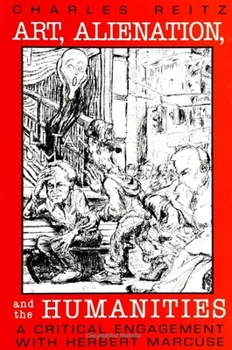Art, Alienation, and the Humanities: A Critical Engagement with Herbert Marcuse
Charles Reitz is Professor of Philosophy and Coordinator of Service Learning at Kansas City Kansas Community College.
Format:Paperback
Language:English
ISBN:0791444627
ISBN13:9780791444627
Release Date:February 2000
Publisher:State University of New York Press
Length:352 Pages
Weight:1.05 lbs.
Dimensions:0.7" x 5.9" x 8.9"
Customer Reviews
1 rating
Overcoming alienation through Arts
Published by Thriftbooks.com User , 22 years ago
Art, Alienation and the Humanities: A Critical Engagement with Herbert MarcuseBy Charles Reitz. SUNY 336 pp. Alienation, reification, estrangement, disempowerment, and exploitation, are some of the concepts Charles Reitz addresses. Reitz presents an elaborate and lucid discussion of Marcuse's misplaced emphasis on aesthetic dimension as a purportedly disalienating dimension and as a means to overcoming the one dimensionality of existence. Reitz's discussion of Marcuse's aesthetic finds a parallel line of discussion regarding Marxian beliefs in the causes of alienation and the means of effective dealienation leading to the dissolution of Marcuse's. The philosophical discussion is complex and requires a good knowledge of the competing philosophical orientations such as those of Dilthey, Comte, Hegel, Schopenhauer, Schiller, Goethe, Nietzsche, Marx and Heidegger among others. Reitz's unique contribution lies not only in presenting Marcuse either as a non-Marxist or even as an anti-Marxist, but in attempting to "recall" viable and promising "theory and conduct of education" embedded in Marcuse's critical theory and work even though he finds Marcuse's argument flawed with contradictions. Marcuse's work in the United States introduced the American academics to the Frankfurt School's views of Marxism. Later Marcuse came to believe that both the Hegelian "dialectic of historical progress" and historical materialism found in classical Marxism (the inevitablity of the transition from capitalism to socialism) were not sufficiently convincing. Marcuse instead suggests the "aesthetic arguments" as a substitute for the Marxist structural and historical analysis of social change. That is, he opts for Dilthey's belief in "emotional" and "political" potential of humanities and intellectual history as opposed to Marx's historical materialism with labor as its foundation. To Marx, in a commodity driven market "art" finds its highest level of appreciation like any other commodity by the need for it and its price.In his later years as contrasted with his middle period (1932-1970) and indeed throughout his intellectual life, Marcuse was in Reitz's estimation suffering from a crippling contradiction between Hegelian idealism and Marxian materialism. In Marcuse's estimation according to Reitz,knowledge and particularly educational knowledge is ontological and the word spirit occupies a central position in the pursuit of philosophical truth (ala Dilthey), replacing the core of Marxism -- Historical Materialism. Thus the selection of idealism and the rejection of materialism and the substitution of ontological aesthetic based on the classical German Idealism from Kant to Heidegger for the historical materialism (p.234). The discussion in "The Future" section is very insightful. Reitz skillfully applies the core of the critical theory and specifically Marcuse's concept of "one dimensional man" to current realities of consumerism, alienation, reification and apathy. Glo





